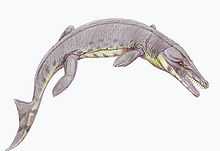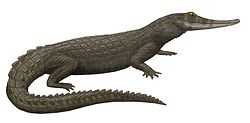Arambourgisuchus
| Arambourgisuchus Temporal range: 59–55Ma Late Palaeocene | |
|---|---|
 | |
| Skull and line drawing | |
| Scientific classification | |
| Kingdom: | Animalia |
| Phylum: | Chordata |
| Class: | Reptilia |
| Superorder: | Crocodylomorpha |
| Family: | †Dyrosauridae |
| Genus: | †Arambourgisuchus Jouve et al., 2005 |
| Type species | |
| †Arambourgisuchus khouribgaensis Jouve et al., 2005 | |
Arambourgisuchus ("[Prof. Camille] Arambourg's crocodile") was a dyrosaurid crocodylomorph from the late Palaeocene of Morocco, found in the region of Sidi Chenane in 2000, following collaboration by French and Moroccan institutions, and described in 2005 by a team led by palaeontologist Stéphane Jouve.
Its type and only species is A. khouribgaensis, after the town of Khouribga, near which the holotype was found.
Material

Four specimens of this taxon have been found:
- OCP DEK-GE 300 (holotype): nearly complete and crushed skull, lacking the anterior part of the rostrum
- OCP DEK-GE 18: crushed, almost complete skull, including mandible
- OCP DEK-GE 269: posterior part of mandibular symphysis with five or six teeth alveoli on each side
- OCP DEK-GE 1200: Anteriormost portion of a mandibular symphysis
The remains of A. khourgbaensis were found in a phosphate mine in the region of Sidi Chenane, part of the Ouled Abdoun Basin. The age of this animal is therefore Thanetian (late Palaeocene).
Systematics
Arambourgisuchus khourbgaensis is a member of the Dyrosauridae, based on the presence of the following synapomorphies:
- presence of large occipital tuberosities
- supratemporal fenestra largely longer than wide
According to Jouve et al. (2005), it is probably one of the most derived forms, but the lack of better material makes a correct determination of its affinities difficult.
Palaeobiology
The skull of A. khourbgaensis was proportionally one of the longest among all of the Dyrosauridae, reaching a length of 1 meter. Its teeth were sharp but strong and large, as well as being less numerous than the ones in Dyrosaurus phosphaticus.
Like other dyrosaurids, it was a marine predator.
References
- Jouve, S., Iarochène, M., Bouya, B. & Amaghzaz, M. (2005). "A new dyrosaurid crocodyliform from the Palaeocene of Morocco and a phylogenetic analysis of Dyrosauridae". Acta Palaeontologica Polonica 50 (3): 581–594.
| ||||||||||||||||||||||||||||||||||||||||||||||||||||||||||||||||||||||||||||||||||||||||||||||||||||||||||

